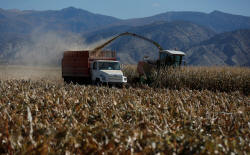U.S. bread, donut makers urge Biden to roll back biofuel
requirements
 Send a link to a friend
Send a link to a friend
 [August 03, 2021] By
Jarrett Renshaw, Chris Prentice and Stephanie Kelly [August 03, 2021] By
Jarrett Renshaw, Chris Prentice and Stephanie Kelly
WASHINGTON (Reuters) - A trade group
representing some of America's biggest baked goods companies is urging
the Biden administration to ratchet back its biofuel ambitions, arguing
that using fuel made from crops could raise the cost of donuts, bread
and other foods.
The complaints mark an unusual entrance by the food industry into the
U.S. energy policy debate, and puts it in an unwitting alliance with Big
Oil, which has for years opposed regulations requiring that fuels made
from corn, soybeans and other crops be added to the nation's gasoline
and diesel.
The American Bakers Association, which represents companies like the
grocer Kroger, donut maker Krispy Kreme and Tastykake parent company
Flower Foods, told Reuters it met with the Environmental Protection
Agency (EPA) last week to urge reduced blending mandates, particularly
for biodiesel.

The EPA administers the nation's biofuels laws.
The group has also met with lawmakers involved in the issue to press its
case, according to its president Robb MacKie.
MacKie said the group held the meetings because its members are hearing
from suppliers of soy and canola oil - staple ingredients in many foods
- that they could run short of stocks by the end of the year as demand
from the biofuels industry compounds already tight global markets.
"We are trying to ring the alarm without being alarmists," MacKie said.
Baked goods companies want the Biden administration to lower biodiesel
blending mandates to 2019 levels or at least "hold the line" on any
growth, he said.
It was unclear whether their demands would have any impact on EPA's
decision-making.
The EPA is currently considering new biofuel volumes requirements for
the coming year under the nation's biofuel law, the Renewable Fuel
Standard (RFS), a process that has been delayed by the economic fallout
from the coronavirus pandemic and by treacherous political
considerations.
Nick Conger, an EPA spokesman, confirmed the agency met with the baker's
trade group, but did not offer details.

[to top of second column] |

Corn is harvested at the Kenison Farms in Levan, Utah, October 5,
2013. REUTERS/Jim Urquhart

"EPA always appreciates input from stakeholders, and we are taking their
concerns into account along with those of the many other RFS stakeholders,"
Conger said.
Around 40% of soy oil consumed in the United States goes to producing fuel, with
most of the rest going into food, according to U.S. government data.
BATTLE WIDENS
The RFS, adopted in 2005 to help farmers and reduce fuel dependence, has created
a nearly 20 billion gallon per year market for the U.S. Farm Belt. But oil
refiners say it has also created a costly regulatory burden that threatens to
bankrupt smaller refining facilities.
Until now, the fight over the policy has been restricted mainly to those two
constituencies.
Kurt Kovarik, Vice President of Federal Affairs for the National Biodiesel
Board, said now is not the time to slow the progress of biodiesel, which he said
is among the cleanest, low-carbon fuels available.
"America's agricultural sector is still emerging from years of disruptions due
to trade wars and weather events. The COVID emergency continues to impact
markets, including agriculture. Undercutting the Renewable Fuel Standard is not
a solution," Kovarik said.
The average price of food in the United States climbed 2.4% in the 12 months
ended June, rising from the previous 2.2% increase, according to the U.S. Labor
Department's Bureau of Labor Statistics.

Domestic production of biodiesel is around 130,000 barrels per day, according to
the U.S. Energy Information Administration.
(Reporting By Jarrett Renshaw, Chris Prentice and Stephanie Kelly; editing by
Richard Pullin)
[© 2021 Thomson Reuters. All rights
reserved.] Copyright 2021 Reuters. All rights reserved. This material may not be published,
broadcast, rewritten or redistributed.
Thompson Reuters is solely responsible for this content. |